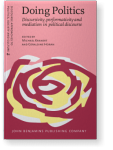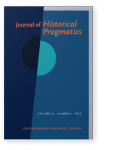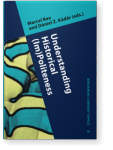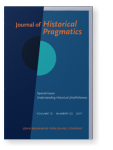Jane Demmen
List of John Benjamins publications for which Jane Demmen plays a role.
2018 Chapter 4. Charting the semantics of labour relations in House of Commons debates spanning two hundred years: A study of parliamentary language using corpus linguistic methods and automated semantic tagging Doing Politics: Discursivity, performativity and mediation in political discourse, Kranert, Michael and Geraldine Horan (eds.), pp. 81–104 | Chapter
In this chapter we use new corpus linguistic software tools to investigate the discourse(s) of labour relations in UK House of Commons debates over the 19th and 20th centuries. Our data is from the Hansard Corpus (1803–2005), and benefits from the annotation of meaning and sense categories with the… read more
2015 A computer-assisted study of the use of Violence metaphors for cancer and end of life by patients, family carers and health professionals International Journal of Corpus Linguistics 20:2, pp. 205–231 | Article
This study combines quantitative semi-automated corpus methods with manual qualitative analysis to investigate the use of Violence metaphors for cancer and end of life in a 1,500,000-word corpus of data from three stakeholder groups in healthcare: patients, family carers and healthcare… read more
2014 Review of Mahlberg (2013): Corpus Stylistics and Dickens’s Fiction Functions of Language 21:2, pp. 248–258 | Review
2013 Pray in Early Modern English drama Journal of Historical Pragmatics 14:2, pp. 263–284 | Article
This study seeks to provide new insights into the development and use of pray in Early Modern English. The study is based on the sociopragmatically annotated Drama Corpus, which combines the drama text samples of three different Early Modern English corpora, comprising a total of 242,561 words from… read more
2012 Nineteenth-century English politeness: Negative politeness, conventional indirect requests and the rise of the individual self Understanding Historical (Im)Politeness: Relational linguistic practice over time and across cultures, Bax, Marcel and Dániel Z. Kádár (eds.), pp. 49–80 | Article
In this paper we argue that the kind of individualistic ethos Brown and Levinson’s (1987) politeness model is accused of — and in particular its notion of (non-imposition) negative face — is not simply a reflection of British culture, but a reflection of British culture at a specific point in time.… read more
2011 Nineteenth-century English politeness: Negative politeness, conventional indirect requests and the rise of the individual self Understanding Historical (Im)Politeness, Bax, Marcel and Dániel Z. Kádár (eds.), pp. 49–81 | Article
In this paper we argue that the kind of individualistic ethos Brown and Levinson’s (1987) politeness model is accused of — and in particular its notion of (non-imposition) negative face — is not simply a reflection of British culture, but a reflection of British culture at a specific point in time.… read more





